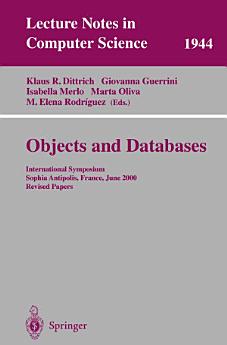Objects and Databases: International Symposium, Sophia Antipolis, France, June 13, 2000. Revised Papers
Klaus R. Dittrich · Giovanna Guerrini · Isabella Merlo · Marta Oliva · M. Elena Rodriguez
មិថុនា 2003 · Springer
សៀវភៅអេឡិចត្រូនិច
206
ទំព័រ
reportការវាយតម្លៃ និងមតិវាយតម្លៃមិនត្រូវបានផ្ទៀងផ្ទាត់ទេ ស្វែងយល់បន្ថែម
អំពីសៀវភៅអេឡិចត្រូនិកនេះ
These post-proceedings contain the revised versions of the papers presented at the \Symposium on Objects and Databases" which was held in Sophia-Antipolis, France, June 13, 2000, in conjunction with the Fourteenth European Conference on Object-Oriented Programming, ECOOP 2000. This event continued the t- dition established the year before in Lisbon (Portugal) with the First Workshop on Object-Oriented Databases. The goal of the symposium was to bring together researchers working in various corners of the eld of objects and databases, to discuss the current state of research in the eld and to critically evaluate existing solutions in terms of their current usage, their successes and limitations, and their potential for new applications. The organizing committee received 21 papers which were reviewed by a p- gram committee of people active in the eld of objects and databases. There were 3 reviews for each paper, and nally the organizing committee selected 9 long papers, 2 short papers, and a demonstration to be presented and discussed at the symposium. The selected papers cover a wide spectrum of topics, including data modeling concepts, persistent object languages, consistency and integrity of persistent data, storage structures, class versioning and schema evolution, query languages, and temporal object-oriented databases. In addition to the regular papers, the symposium included an invited p- sentation, given by Prof. Malcolm Atkinson from the University of Glasgow (Scotland) where he heads the Persistence and Distribution Group.
អំពីអ្នកនិពន្ធ
Klaus R. Dittrich is a professor in the Department of Information Technology at the University of Zurich, where he heads the Database Technology Research Group. He is the current secretary of the VLDB Endowment Board & has been a member of the ACM SIGMOD Advisory Committee. Professor Dittrich has been nominated as a Distinguished Visitors. He has over 100 scientific publications in the area of database technology &, in particular, has followed & influenced the development of object database technology from its inception.
វាយតម្លៃសៀវភៅអេឡិចត្រូនិកនេះ
ប្រាប់យើងអំពីការយល់ឃើញរបស់អ្នក។
អានព័ត៌មាន
ទូរសព្ទឆ្លាតវៃ និងថេប្លេត
ដំឡើងកម្មវិធី Google Play Books សម្រាប់ Android និង iPad/iPhone ។ វាធ្វើសមកាលកម្មដោយស្វ័យប្រវត្តិជាមួយគណនីរបស់អ្នក និងអនុញ្ញាតឱ្យអ្នកអានពេលមានអ៊ីនធឺណិត ឬគ្មានអ៊ីនធឺណិតនៅគ្រប់ទីកន្លែង។
កុំព្យូទ័រយួរដៃ និងកុំព្យូទ័រ
អ្នកអាចស្ដាប់សៀវភៅជាសំឡេងដែលបានទិញនៅក្នុង Google Play ដោយប្រើកម្មវិធីរុករកតាមអ៊ីនធឺណិតក្នុងកុំព្យូទ័ររបស់អ្នក។
eReaders និងឧបករណ៍ផ្សេងទៀត
ដើម្បីអាននៅលើឧបករណ៍ e-ink ដូចជាឧបករណ៍អានសៀវភៅអេឡិចត្រូនិក Kobo អ្នកនឹងត្រូវទាញយកឯកសារ ហើយផ្ទេរវាទៅឧបករណ៍របស់អ្នក។ សូមអនុវត្តតាមការណែនាំលម្អិតរបស់មជ្ឈមណ្ឌលជំនួយ ដើម្បីផ្ទេរឯកសារទៅឧបករណ៍អានសៀវភៅអេឡិចត្រូនិកដែលស្គាល់។






